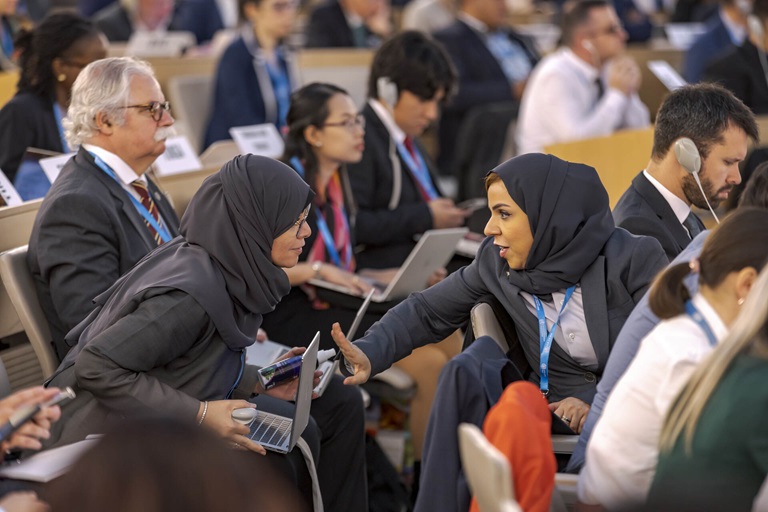
Code of Conduct
to prevent harassment, including sexual harassment, at WHO events
Committee A at the 76th World Health Assembly on 23 May 2023 at the Palais des Nations in Geneva, Switzerland.
WHO is committed to enabling events where everyone can participate in an environment that is inclusive, respectful and safe. All WHO event participants are expected to behave with integrity and respect towards other participants, who are either in attendance of or involved with any WHO event. All WHO event participants thus agree to abide by this Code of Conduct.
Any participant at a WHO event is expected to take note of the Organization’s standards of conduct. As such the requirements in the Code of Conduct to prevent harassment including sexual harassment at WHO events and WHO’s policy framework apply.
By accepting the invitation to any WHO events, as outlined below, it is understood that the participant has read and understands how the Code of Conduct applies and to abide by it.
Participants may report any concerns or suspicions about misconduct that may occur during the course of WHO events by writing to [email protected] or through WHO’s integrity hotline.
Prohibited conduct
Harassment
Harassment in any form and on any basis is prohibited at WHO events. Harassment is any behaviour directed at another person with the effect of offending, humiliating or intimidating them. The person engaging in the behaviour knows or reasonably ought to know that this behaviour is humiliating or intimidating.
Sexual harassment
Sexual harassment is a specific type of prohibited conduct that is any unwelcome conduct of a sexual nature that might reasonably be expected or perceived to cause offence or humiliation. It may involve conduct of a verbal, nonverbal or physical nature, including written and electronic communications. It may occur between people of the same or different genders.
Complaint process
Participants who feel they have been harassed at a WHO event may report the incident to the WHO event organizer or relevant security authority. Participants who witness such harassment should also make a report directly to [email protected] or via the integrity hotline*. WHO event organizers are expected to take appropriate action in accordance with applicable policies, regulations and rules.
Appropriate action may include, but is not limited to:
- requesting that the offender immediately stop their offensive behaviour;
- suspending or terminating the offender’s access and registration to the WHO event and future events;
- conveying the complaint to any investigative or disciplinary authority with jurisdiction over the person accused of harassment; and
- conveying a report to the employer or entity with jurisdiction over the offender for appropriate follow-up action.
Victims of alleged harassment may also seek help from relevant authorities, bearing in mind the applicable legal framework. Participants should never knowingly make false or misleading claims about prohibited conduct.
Integrity hotline
The integrity hotline provides a safe and independent way to report concerns about issues involving WHO. Reports can be made confidentially or anonymously.
Prohibition of retaliation
Retaliation against those who file a report or have filed a report after witnessing an incident is prohibited. Threats, intimidation and any other form of retaliation are not tolerated and WHO or another entity responsible for a WHO event will take any reasonable appropriate action needed to prevent and respond to retaliation, in accordance with applicable policy, regulations and rules.
* Please note that if you are in immediate danger you should contact on-site security agents, as the above reporting mechanisms were not established to provide immediate protection from a security threat.

